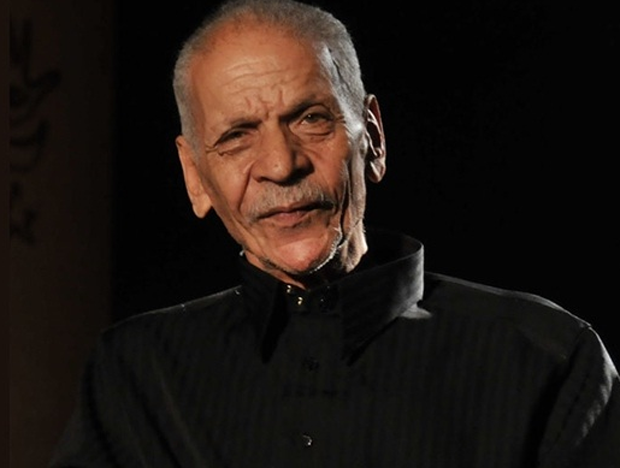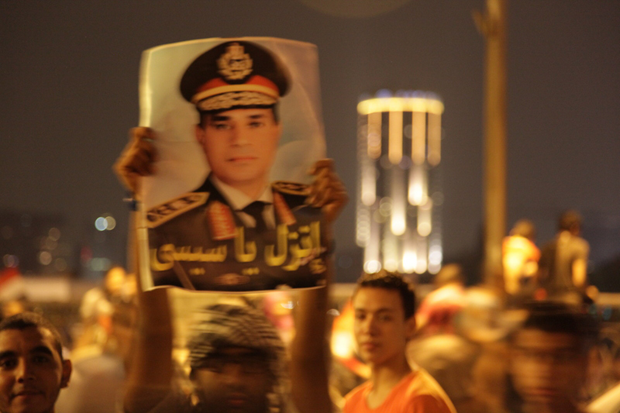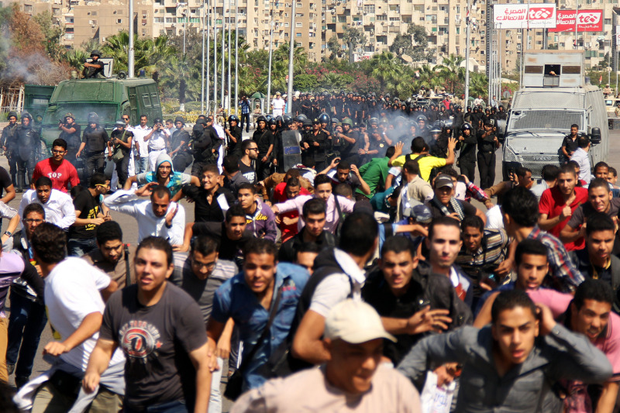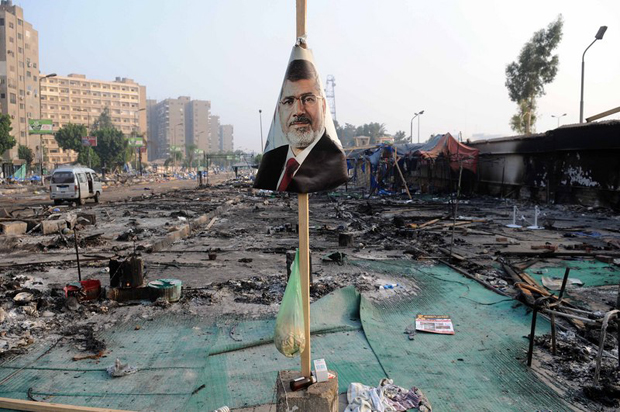5 Dec 2013 | Egypt, News and features, Religion and Culture

Ahmed Fouad Negm (Photo: © Ahmed Manawishi)
The Egyptian poet Ahmed Fouad Negm died on December 3 at the age of 84.
Known as the “poet of the people”, Fouad Negm inspired generations of young Egyptians to hope for change through his prose which often struck a comparison between his love for his country and a harsh criticism of its flaws. It was during the 1970s that his poetry became most popular as musician Sheikh Imam Issa sang his works in coffee houses and universities.
His political views in favour of the poor and working class were often expressed in his poems which lead him to be jailed under the rule of two former Egyptian presidents: Gamal Abdel Nasser and Anwar Sadat. Fouad Negm was also vocal regarding his support for the 2011 uprising that witnessed the demise of the Mubarak regime.
“I am not a humble person and I am not stupid; I know I am a poet that has affected this nation,” he once told an interviewer.
Fouad Negm’s passing comes a week before he was due to travel to the Netherlands to receive the 2013 Principal Prince Claus Award in appreciation of his literary contributions and his unwavering advocacy on behalf of the poor and the disenfranchised.
The Prince Claus Fund said: “Ahmed Fouad Negm is honoured for creating true poetry in vernacular Arabic that communicates deeply with people; for his independence, unwavering integrity, courage and rigorous commitment to the struggle for freedom and justice; for speaking truth to power, refusing to be silenced and inspiring more than three generations in the Arab-speaking world; for the aesthetic and political force of his work highlighting the basic need for culture and humour in harsh and difficult circumstances; and for his significant impact on Arabic poetry bringing recognition to the rich literary potential of the colloquial language.”
This article was published on 5 Dec 2014 at indexoncensorship.org
3 Dec 2013 | Egypt, News and features, Politics and Society, Religion and Culture

Egyptians gathered on the in Corniche near Qasr Nil Bridge in July 2013 to celebrate news of the announcement by the Egyptian Army Chief General el Sisi, that President Morsi had been removed from power in “response to the will of the people.” (Photo: Sharron Ward / Demotix)
Last week, when Egyptian security forces violently dispersed activists rallying against a controversial new anti-protest law, Egyptian media was full of praise for them the following day. Instead of condemning the excessive use force by riot police who beat, sexually assaulted and detained scores of opposition protesters, newspaper editors portrayed the Interior Ministry as “the victor” in the confrontation over the new gag law.
“The Interior Ministry has passed the test on the anti-protest law,” read Wednesday’s bold red headline in the semi-official Al Ahram daily. The independent Al Watan, meanwhile, declared on its front page that the Ministry of Interior had “decidedly resolved the battle over the anti-protest law.”
Headlines, editorials and articles labelling democracy activists “anarchists and “thugs” signal that most Egyptian media has reverted to its old pre-revolution ways, siding with the military-backed government against the opposition. During the January 2011 mass uprising that toppled former President Hosni Mubarak, Egyptian media had vilified the opposition activists, describing them as “foreign agents” and “hired thugs.”
Media discourse in Egypt today is reminiscent of the Mubarak era. Then, almost all media outlets had adopted the state line and carefully avoided crossing the so-called ‘red lines’. The only difference is that today, the media has voluntarily and ungrudgingly aligned itself with the military-backed government. During Mubarak’s tenure journalists were motivated by fear of falling out of favour with the authoritarian regime. Ironically, since Muslim Brotherhood President Mohamed Morsi was toppled by military-backed protests last July, the Egyptian media’s support for the country’s powerful military has come with little coercion from the generals who are riding a wave of popularity and ultra-nationalist sentiment.
Since Morsi’s ouster, the Egyptian media has glorified the military while persistently demonising both the Muslim Brotherhood and the deposed Islamist President, continuing the vilification trend it had started when the former president was still in power. Morsi’s supporters have consistently been branded “terrorists” and “liars” by Egypt’s state-owned and private media alike. As Morsi’s supporters staged a sit in last July demanding “the reinstatement of the legitimate president”, Youssef El Husayni, a presenter on the privately-owned channel ON TV accused the protesters of murder, saying that they “deserved to be hanged.” Other TV talk show hosts also accused the anti-coup protesters of “getting paid to stay on the streets”. On November 4, the day Morsi’s trial began, the former president was labelled “hysterical” by several Egyptian newspapers including the independent El Youm el Sabe’e and El Masry El Youm for insisting he was still the country’s legitimate president and could not be tried by the court. He was also criticized by journalists for refusing to wear his prison uniform to court–a decision that drew unfavourable comparisons with his predecessor Hosni Mubarak who had previously appeared in court in the white garment.
Earlier this month, the privately-owned network CBC suspended satirist Bassem Youssef’s wildly popular show Al Bernameg (The Programme) after an episode that poked fun at the public fervour for the military and in particular, at the ‘Sissi-mania’ gripping the country. Egypt’s De facto ruler El Sissi earned the adoration of millions of Egyptians when he ousted Morsi, positioning himself as the “guardian of the people’s will” and claiming he had “saved the country from a looming civil war.” He has since been compared by some Egyptian media to Egypt’s former ultra-nationalist leader Gamal Abdel Nasser. In recent months, there have increasingly, been calls for El Sissi to run in the next presidential election.
Surprisingly, the decision to take Youssef’s show off the air came from CBC’s senior management not–as many had initially believed–from strongman El Sissi. Youssef’s last episode met with a public outcry and almost immediately after the broadcast, CBC issued a statement distancing itself from the comedian’s views. The station blamed the suspension of the show on “technical” and “business” issues rather than on the show’s editorial content. CBC’s decision has led to fierce public criticism of the network which had previously given Youssef a free hand to mock former President Mohamed Morsi and his Islamist group. Throughout Morsi’s one year term in office, Youssef had relentlessly kept up his attacks on the former President despite repeated threats of legal action against him. Many of Youssef’s fans have threatened to boycott CBC after the TV satirist quit the channel over the suspension of the show.
Meanwhile, the “red lines” are back at Egyptian State TV where show presenters and anchors have kept up the pro-military rhetoric in recent months for fear of being stigmatized as “pro-Muslim Brotherhood ” and “fifth columnists.” The latter is a term that is being widely used to describe sympathizers or supporters of the Muslim Brotherhood whose activities were banned by a court ruling in November. Presenters who are suspected of being sympathetic to the outlawed Islamist group are being deprived of air time. Several presenters have faced investigations in recent weeks over “their shameful links to the enemy Islamist group”. Journalists have been repeatedly accused of “destroying the country and wreaking havoc to abort the goals of the revolution.” A list of names of so-called “fifth column TV presenters and activists” has gone viral on social media networks Facebook and Twitter after being posted on several local websites with the declared aim of “exposing and sidelining the traitors.” Those on the list–which includes reform leader El Baradei, revolutionary activists and prominent TV journalists known for their objectivity–have also being accused of receiving foreign funding.
Many journalists have again resorted to practising self-censorship for fear of being labelled “enemies of the state.” Ironically, the pressure on them has come from fellow-journalists rather than from the generals themselves. Those piling the pressure are journalists who were either appointed by the ousted Mubarak regime or others with strong links with the country’s notorious security services. In September, controversial talk show host Tewfik Okasha, who is also the owner of the private El Fara’een Satellite Channel, gave Defence Minister El Sissi “an ultimatum to purge the media of fifth columnists”. Abdel Rahim Ali, the chief editor of El Bawaba news site, meanwhile told Al Midan TV in September that “those who oppose the reinstatement of state security are from the fifth column.” He did not hesitate in naming the activists and political figures he suspected had links with the “Islamist terror organization.” Responding to a list of suspect-fifth columnists published in the state-owned Al Ahram El Arabi in September, veteran columnist Fahmi Howeidi warned that “such accusations only serve to further empower the country’s notorious state security service, the SSS.” The SSS, known in Egypt as “Amn El Dawla” was a symbol of police oppression under ousted President Hosni Mubarak. It was disbanded in March 2011 only to return a month later, albeit under a different name–the National Security Service.
The “Fifth Column Campaign” targeting government critics with the aim of silencing voices of dissent, has succeeded in fulfilling its objective, lament rights campaigners.
“In this atmosphere of deep political divisions and at a time when anyone can be accused of espionage for merely mentioning such ‘taboo’ words as ‘coup’ and ‘reconciliation’, many in our profession have opted to play it safe by siding with the stronger power–the military. This is an indirect way of muzzling the press and unfortunately, it is working,” Sameh Kassem, Cultural Editor who works for the independent Al Dostour said.
In the ‘new Egypt’ –now once again under the tight grip of military rule — where scores of journalists have been assaulted and detained for covering the anti-coup protests, the critics are falling silent.
This article was published on 3 Dec 2013 at indexoncensorship.org
25 Oct 2013 | Egypt, News and features, Politics and Society

Al-Azhar University students run from tear gas fired by security forces during the anti-military protest outside the university campus, in Cairo, Egypt.
(Photo: AHMED TARANH / Demotix)
A controversial bill regulating protests has provoked public outrage in Egypt, fuelling fears among rights activists and revolutionary forces that the gains made since the January 2011 mass uprising that toppled President Hosni Mubarak may be reversed.
Slammed by Egyptian rights groups as “draconian” and “repressive,” the proposed draft law gives security forces the right to break up any gathering held without government authorization and allows the use of lethal force against demonstrators “threatening public order.” The protest bill also criminalizes the use of masks or face veils by protesters whilst unlawful demonstrators risk up to five years in prison.
Written by the Justice Ministry and approved earlier this month by the cabinet–albeit with reservations from a handful of liberal ministers– the draft law now awaits ratification by the Interim President Adly Mansour before it can pass. Egypt’s political forces have called on the government to postpone issuance of the law until after parliamentary elections are held in the summer of 2014. In a joint statement released this week by 17 Egyptian rights groups condemning the proposed bill, the activists insisted it should be scrapped altogether and warned it would stifle freedom of expression and is “tantamount to a permanent state of emergency.”
Seeking to appease public anger over the protest bill, Prime Minister Hazem El Beblawi said in a televised interview broadcast on the independent CBC Channel earlier this week, that the government would engage political forces in a discussion on the draft law in the coming weeks and would consider proposed amendments to the bill. The premier’s words however, did little to win over the skeptics: : ” The Interior Minister will have the final word on the matter. That’s because of the media narrative of there being a war on terror,” Hisham Hellyer, a fellow at the Brookings Institute was quoted by the Financial Times as saying this week. Ahmed Maher , the co-founder of the April 6 Youth Movement which played a key role in planning and organizing the 2011 mass protests that toppled President Hosni Mubarak, meanwhile told the Washington Post that the draft law was “an attempt to bring back the police state.” Leaders of Tamarod, the movement that brought the interim government to power by collecting signatures in a petition registering opposition to President Morsi, have also joined the chorus of criticism, describing the draft law as “unjust.”
The outcry over the protest bill comes as the country is wracked by anti-military protests staged by supporters of Islamist President Mohamed Morsi who was overthrown in an army coup on July 3. A brutal security crackdown by security forces to break up two sit ins in Cairo by Muslim Brotherhood loyalists on August 14 and violent street clashes between Morsi’s supporters and his opponents over the last three months have left hundreds of protesters dead (the majority of them from the pro-Morsi camp). In one of the bloodiest days of violence since Morsi’s ouster, at least 57 people were killed on October 6 when Morsi’s supporters clashed with security forces as they tried to reach Tahrir Square to stage an anti-coup rally. Meanwhile, nearly 2,000 Muslim Brotherhood members have been arrested and detained since President Morsi was deposed.
Despite the security crackdown, Morsi’s followers remain defiant and have called for more protests on November 4 –the day the ousted president will be put on trial. Organizers of the protests say they will decry “the kidnapping and trial of the legitimate president” and will also denounce the draconian law they believe specifically targets Islamists. Rights activists disagree however. They say laws indiscriminately apply to all citizens and everyone will pay a price. “Claims that the protest law is to confront the Brotherhood is deception and a lie,” Gamal Eid, a prominent rights lawyer and Head of the Arabic Network for Human Rights Information , wrote on his Twitter feed.
Because of its hawkish tint, some critics believe the law will most likely be ignored by a people who have grown accustomed to expressing their grievances and resentment, post revolution. “There will be no way to curtail Egypt’s flood of protests using the measures stated by the law without forceful confrontations that will inevitably cause further protests in consequence,” political commentator Bassem Sabry wrote in Al Monitor this week . He added that iron-fisted laws like this one –and others such as the proposed anti-terrorism bill that advocates the death penalty for those found guilty of acts of aggression against public property that lead to fatalities– will tarnish the image of the administration and will likely be found unconstitutional under Egypt’s new charter, whose articles reportedly protect the rights to protest.
Rights groups meanwhile said in their joint statement on the proposed bill that social and political solutions –rather than security ones –are needed to restore stability and increase security. Instead of issuing draconian laws that would fail to achieve the desired goals, the interim government should instead focus on reforming the country’s security apparatus through specialized training for security personnel , they advised.
This article was originally posted on 25 Oct 2013 at indexoncensorship.org
15 Aug 2013 | Comment, Egypt, News and features

Egypt faced a new phase of uncertainty after the bloodiest day since its Arab Spring began, with nearly 300 people reported killed and thousands injured as police smashed two protest camps of supporters of the deposed Islamist president. (Photo: Nameer Galal / Demotix)
As the numbers steadily mount of those killed by the Egyptian military and police in yesterday’s attacks on Muslim Brotherhood camps, the prospects for Egypt’s ‘Arab spring’ are looking bleak.
The violent destruction of the two camps, and the indiscriminate shootings, beatings and arrests of supporters of ousted President Mohamed Morsi, and of journalists, was clearly planned. The country’s military rulers have taken little time to demonstrate their contempt for the many Egyptians who wrongly thought the army could usher in a more pluralist rights-respecting democracy. The hopes of those who saw July’s coup as somehow too positive to warrant such a label now lie in tatters, with Mohamed ElBaradei’s inevitable resignation just one small illustration of that.
Is this simply a return to square one – back to a Mubarak-style, military-run Egypt? At one level surely it is, with army head General al-Sisi showing neither shame nor compunction in such a murderous installation of the new state of emergency.
But while the similarities to the Mubarak era are clear, this is a new and different Egypt. The millions who demonstrated in Tahrir Square in 2011, and again this June in protest at President Morsi’s authoritarian approach to government, are not simply going to accede to corrupt and vicious military rule once more. And the brutal violence against the Muslim Brotherhood protesters is most likely to beget more violence rather than the destruction of the Brotherhood that the army appears intent on.
With the violent face of the new Egyptian regime now clearly on display to the whole world, with no respect for rights of protesters, or media, or ordinary citizens, the international response has been shamefully muted. The EU’s foreign policy supremo, Cathy Ashton, called for the military to exercise the “utmost restraint” and for an end to the state of emergency “as soon as possible, to allow the resumption of normal life”. Meanwhile Samantha Power, Obama’s UN ambassador, tweeted weakly that the “forcible removal” of protesters was “a major step backward”.
Earlier in the week, the US and EU failed in their mediation attempts to stop the attacks on the camps, that all could see were coming. The key question now should be whether they are prepared to go for tougher diplomacy in an attempt to exert some leverage on the disastrous social and political dynamics that have now been unleashed so far. This would have to revolve around suspension of the $1.3 billion of military aid the US gives Egypt each year.
Obama’s first statement of condemnation finally came today but with no hint of the sort of leadership or signal that suspension of aid would send. Obama’s cancellation of military exercises next month will not worry Egypt’s generals much. And his uplifting speech on a new beginning at Cairo University in 2009 – and his Nobel Prize that year – are surely now lost in the dust and ashes of the aftermath of Wednesday’s violence and the US’s refusal to use the tools of influence it has. For now, more urgent and serious statements are coming rather from the UN.
Whether Egypt’s citizens who demonstrated for an end to military rule, and for a genuine pluralist democracy can regroup enough to have the influence to stop the downward spiral looks doubtful. But the spirit of Tahrir Square did not die yesterday. And if Egypt is now in winter, then spring at some point must come again. But for now the winter looks to be just beginning.
This article was originally published on 15 Aug 2013 at indexoncensorship.org. Index on Censorship: The voice of free expression.




